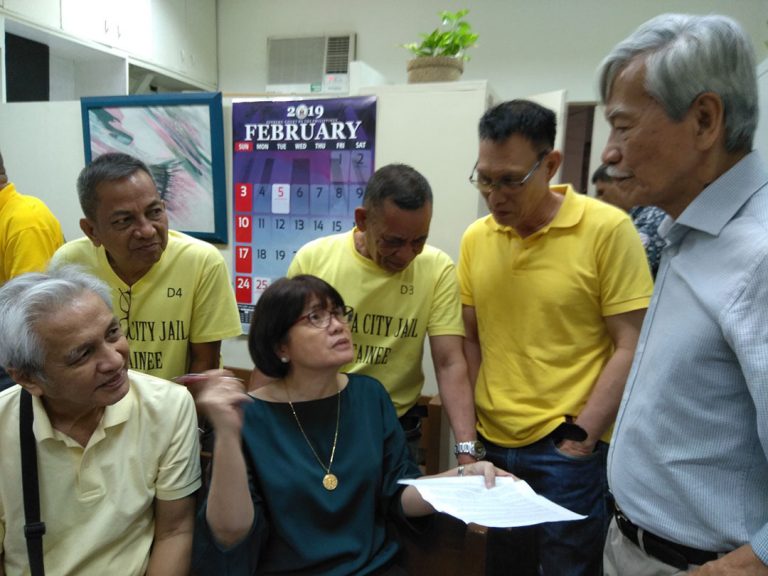
“The Leyte case has set the bar so low yet it has become the golden standard for manufactured cases of political persecution.”
MANILA — Nearly 13 years ago, Glecerio Roluna was arrested and detained by elements of the Army’s 43rd Infantry Battalion in Sogod, Southern Leyte. He was charged with multiple murder in relation to an alleged mass grave found in Baybay, Leyte in 2000.
Roluna, a self-declared former New People’s Army (NPA) guerrilla, was released three or four years later. Appearing as a state witness during cross examination Feb. 20 before the Manila Regional Trial Court Branch 32, Roluna said in Cebuano, “I requested to be with my family and promised them I will not go back to the movement.”
Roluna said he was granted amnesty after he signed an affidavit implicating his alleged former comrades. He is one of the witnesses in a multiple murder case filed against more than 70 activists over an alleged mass grave of alleged victims of the Communist Party of the Philippines (CPP) and New People’s Army (NPA) found in Inopacan, Leyte in 2006. Among the accused were Jose Maria Sison, Satur Ocampo, Rafael Baylosis, Randall Echanis and Vicente Ladlad.
Asked by Rachel Pastores, one of the defendants’ lawyers, to whom did he apply for amnesty, Roluna said it was with Vivero, referring to Assistant Provincial Prosecutor Rosulo U. Vivero.
Vivero handled the 2000 case in Baybay, which was dismissed on January 10, 2005 due to insufficient evidence. Vivero then filed the multiple murder case against more than 70 activists in 2007 in Hilongos,Leyte.
Five of the victims, whose skeletal remains were allegedly found in Monterico village, Baybay, Leyte were the same alleged victims allegedly found in 2006 in Mt. Sapang Dako, Inopacan, Leyte, according to the lawyers of the accused.
Inconsistencies
Pastores pointed out the inconsistencies in Roluna’s statements in court and the affidavit he allegedly wrote 12 years ago.
His affidavit used as evidence in the Hilongos case was dated 2006. Asked when he wrote his affidavit, Roluna said it was six to eight months after he was captured. According to a previous Bulatlat article, Roluna was arrested, along with two others, on June 4, 2006. Pastores said if it was eight months after his arrest, the affidavit should have been dated 2007.
Roluna later admitted that he wrote the affidavit while he was in captivity.
In a statement, Ladlad’s wife Fides Lim, said, “What gives in this recycling of witnesses and dismissed cases? The Leyte case has set the bar so low yet it has become the golden standard for manufactured cases of political persecution.”
Ladlad told Bulatlat that the Hilongos case was cited in the proscription case filed by the Department of Justice (DOJ) seeking to designate the Communist Party of the Philippines and New People’s Army as terrorist organizations.
Read: Terror-tag plea against the Left: Recycled cases, recycled tactic
Ladlad said he is confident that the Hilongos case would be dismissed, noting that former Senator Joker Arroyo testified in court on Feb. 27, 2009.
Arroyo testified that he was the lead counsel for Ladlad when the latter was a political prisoner from 1983 to 1986 in Camp Nakar in Lucena City, Quezon, and that by virtue of his detention, Ladlad could not have participated in any alleged killing in Leyte in 1985.
Read: Murder Case vs. Ladlad, Other Activists Evokes Memories of Martial Law
Lim pointed out that her husband, who is now a political prisoner at Camp Bagong Diwa, Bicutan for a trumped-up case of planted firearms, is recognized by the Human Rights Victims Claims Board as an eligible claimant for being a victim of political imprisonment and torture during martial law.
Other respondents such as Satur Ocampo, Jose Ma. Sison and wife Julie, and Randall Echanis were also political prisoners at the time period of this case and have likewise received compensation as eligible claimants under the law which constituted the Human Rights Victims Claims Board.
Besides Ladlad, Ocampo, Oscar Belleza, Dario Tomada, Norberto Murillo and Exuperio Lloren were also present during the hearing.
“This case falls flat on its face,” Lim told Bulatlat.
The post Hilongos, Leyte case| Recycled evidence, inconsistencies reek of political persecution appeared first on Bulatlat.